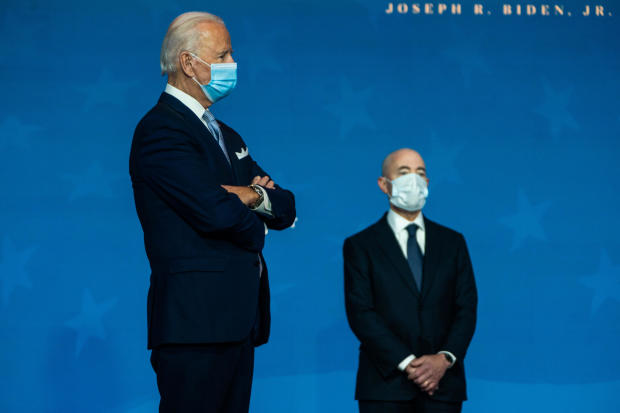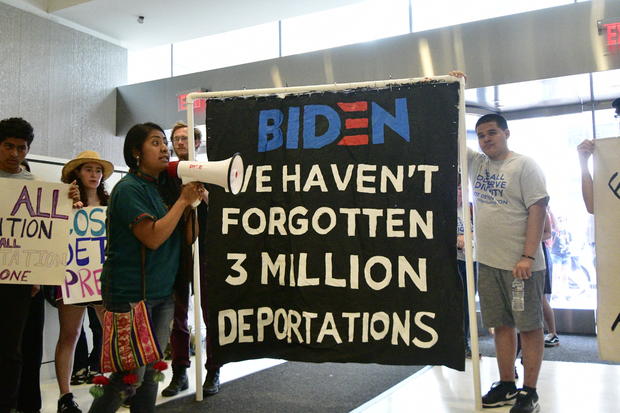Biden plans quick executive action on immigration, but warns of potential delay on legislation
Shortly after taking office this week, President-elect Joe Biden plans to begin gradually making it easier to seek asylum along the U.S.-Mexico border, impose a deportation moratorium and extend protections for so-called "Dreamers" using his executive authority, people briefed on the plans told CBS News.
He also plans to propose a broad immigration bill that, if passed by Congress, could legalize millions of immigrants living in the U.S. without legal permission.
But in an early sign that the incoming president could struggle to fulfill some of his bolder campaign promises, Mr. Biden is asking immigration reform advocates for patience, cautioning that his administration and Congress may not be able to pass a large-scale immigration revamp in the first 100 days of his presidency, according to three participants in a meeting the Biden team held with Latino leaders last week.
Mr. Biden and his team cited the ongoing pandemic, the economic downturn and the upcoming Senate impeachment trial as reasons for a likely delay. Participants in the meeting, all veterans of past fights for changes in immigration policy, said the warning is understandable, and they praised the ambitious legislative proposal.
Domingo Garcia, who attended the meeting on behalf of the League of United Latin American Citizens, said Biden's proposal plan would be "transformative for millions of new Americans." Hector Sanchez, executive director of Mi Familia Vota, said the plan is "the most progressive I've seen" from any president.
But Ramiro Cavazos, the president of the U.S. Hispanic Chamber of Commerce, said he and other participants stressed to Mr. Biden's team that they still expect action on immigration, despite the other challenges.
"We made it very clear, all of us collectively, that because it's a new administration and the Senate and the House will be under the control of the same party, that they need to tackle immigration," Cavazos told CBS News. "We missed that opportunity under President Obama and clearly, over the last four years, Latinos have been under attack."
During that meeting, Mr. Biden and his advisers reiterated his pledge to immediately introduce a bill that would allow the estimated 11 million undocumented immigrants in the U.S. to become lawful permanent residents and eventually U.S. citizens. Immigrants hoping to benefit from the proposal, which would be the first major legalization law since 1986, would need to pay fees to apply.
Advocates were also assured during the meeting that the incoming administration would quickly start reversing the flurry of executive actions on immigration taken by President Trump. They were told Mr. Biden will halt wall construction along the southern border, implement a 100-day freeze on deportations from the interior and bolster the government's capacity to review cases of migrants seeking asylum, which the Trump administration has severely restricted.
Mr. Biden's team said the Deferred Action for Childhood Arrivals (DACA) program — which Mr. Trump unsuccessfully tried to end — would be extended for four years, safeguarding the work permits and protections from deportation of more than 640,000 undocumented immigrants brought to the U.S. as children.
In a memo on Saturday, incoming White House chief of staff Ron Klain said Mr. Biden will also issue executive orders during his first days in office to help advocacy groups locate and reunite migrant families separated during the "zero tolerance" border crackdown and to rescind Mr. Trump's travel and immigration restrictions on 13 countries, most of which are majority Muslim or African.
According to Garcia and Cavazos, Mr. Biden and his team did not discuss any border security and immigration enforcement components to the legalization plan, items that have been historically seen as essential to garnering Republican support for an immigration reform bill. The text of the bill has yet to be disclosed and Mr. Biden's transition team did not respond to requests for comment.
Mr. Biden distanced himself from the Obama administration's high rate of deportations in the closing weeks of the 2020 presidential campaign. In his final debate with Mr. Trump, he conceded that not prioritizing immigration reform during the Obama years was a mistake.
"It took too long to get it right," Mr. Biden said at the October 23 debate.
That night, the former vice president also made his pledge to work with Congress on immigration reform in his first 100 days. How that might happen is still up for debate.
California Democratic Congressman Raul Ruiz said he and his team have been in touch with Mr. Biden's legislative team to sort out how immigration bills could be passed in a closely divided Congress. One option, he said, is to try to pass smaller bills on specific immigration issues that were passed by the Democratic-led House in 2019. These include plans that would legalize hundreds of thousands of farm workers, place DACA recipients on a pathway to U.S. citizenship and grant Temporary Protected Status to some Venezuelans in the United States.
"They are low-hanging fruit in the sense that they already passed, so we know that they have broad support in the Democratic caucus. And they provide the basis and the building blocks of a larger, comprehensive immigration bill on Day One," Ruiz, recently elected as chair of the Congressional Hispanic Caucus, told CBS News.
Another potential standalone bill being crafted by Texas Democratic Congressman Joaquin Castro would allow a broad group of immigrant workers deemed essential during the pandemic — from health care personnel, to food service and hotel staff — to apply for green cards and obtain deportation relief while their cases are adjudicated, according to an outline reviewed by CBS News.
Representative Lou Correa, a moderate from California, said he worries immigration reform may not be prioritized due to the pandemic and other issues. He agreed that Mr. Biden should prioritize the response to the coronavirus crisis, but said immigration should take precedence over other issues like changes to the health care system.
Otherwise, Correa said, the chance to pass immigration reform could fade away like it did during Mr. Obama's first term, when he dealt with the Great Recession and prioritized the passage of the Affordable Care Act. Like in Mr. Obama's honeymoon period, Democrats will now control the Senate and the House, but with slimmer majorities.
"President Obama made some promises that he didn't keep," Correa told CBS News, referring to Mr. Obama's pledge to introduce an immigration reform bill during his first year in office.
"And we can all look at the excuses of why Obama wasn't able to deliver — and they're all good," Correa added. "But politically the reality is this: you as a president have only so much political capital and you can only do so much heavy lifting before you can't anymore."
Sanchez, whose group registered and mobilized thousands of Latino voters in swing states including Arizona and Georgia — voters that helped Democrats narrowly win the White House and other key Senate races — said his group intends to continue pressuring Mr. Biden and congressional Democrats to act quickly, especially with so many Latino workers reeling from the health risks of the pandemic or struggling to stay employed.
"We'll keep putting on pressure," Sanchez told CBS News. "There will always be in their eyes another priority and not immigration. But no excuses this time."
Bo Erickson contributed reporting.







